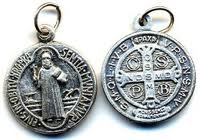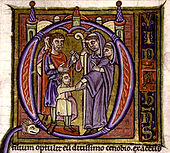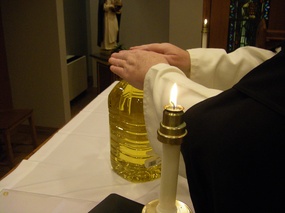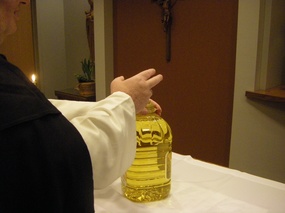 There is a contingent of the Catholic people who still believe in the pious usefulness of sacramentals –not to be confused with sacraments–, those items blessed by a priest or deacon that point to the Divine Majesty: people, medals, scapulars, water, crucifix, vestments, vessels for Mass, salt, oil, pictures of saints, rosaries, etc. I am one of those Catholics who believe that the proper use of sacramentals are extraordinarily helpful to the practice of my faith.
There is a contingent of the Catholic people who still believe in the pious usefulness of sacramentals –not to be confused with sacraments–, those items blessed by a priest or deacon that point to the Divine Majesty: people, medals, scapulars, water, crucifix, vestments, vessels for Mass, salt, oil, pictures of saints, rosaries, etc. I am one of those Catholics who believe that the proper use of sacramentals are extraordinarily helpful to the practice of my faith.
The new Book of Blessings has lots of blessings of things and places, but the Weller edition of the Roman Ritual is head and shoulders better than the Book of Blessings. The order of blessing always includes the reading of Scripture, a prayer, and the sprinkling of holy water. It belongs to the Church to set the parameters of sacramentals; over the years she has given directions to maintain, modify, develop and abrogate sacramentals. Most are given to us by the Church, though some are given by the Lord. We ought to be obedient to Mother Church.
Sacramentals are not magic; they aren’t contributing to superstition. The difference between a sacramental and magic is the intention, the attitude or motivation for using the blessed object, place or person. The honest user of sacramentals want to be closer to the Triune God. The false user wants to manipulate God.
Let me return to the distinction I mentioned above: sacraments and sacramentals are not the same. They have different ends. The Church defines a sacramental as a sacred sign that brings about the effects obtained through the Church’s intercession. The seven Sacraments are designed by Jesus, and always do exactly what they are meant to do. Liturgical and canonical theologians say that sacraments work ex opere operato (“from the deed done”). As I noted about, sacramentals are given to us by the Church, however, though some are given by Jesus. A sacramental “works” through prayer of the Church (ex opere operantis Ecclesiae) but they also work ex opere operantis, that is, through the pious disposition of the person using them –there is a subjective quality here. You know from experience and from movies that sacramentals keep away evil spirit, and piously take away venial sin and prepare the soul for grace.
The Catechism of the Catholic Church (CCC) teaches that
Sacramentals are sacred signs instituted by the Church. They prepare men to receive the fruit of the sacraments and sanctify different circumstances of life. Among the sacramentals blessings occupy an important place. They include both praise of God for his works and gifts, and the Church’s intercession for men that they may be able to use God’s gifts according to the spirit of the Gospel. In addition to the liturgy, Christian life is nourished by various forms of popular piety, rooted in the different cultures. While carefully clarifying them in the light of faith, the Church fosters the forms of popular piety that express an evangelical instinct and a human wisdom and that enrich Christian life. (1677-79).
The Code of Canon Law (1983) upholds the theology when it says, “Sacramentals are sacred signs by which effects, especially spiritual effects, are signified in some imitation of the sacraments and are obtained through the intercession of the Church” (1166; Cf, canons 1166-1172).
I wear a Byzantine Crucifix that I’ve worn for the last 12 years. The reason why I wear it is to remember that I desire to be placed at the foot of the cross with Blessed Mary and Saint John the Evangelist. It was properly blessed by Abbot Joseph and I kiss the crucifix as I remove it from my person prior to bed. I also use holy water in the house and at the edges of the property. In the past I’ve had icons properly blessed.
The Catholic Encyclopedia will fill out more information.
A Catholic’s use of sacramentals is a richer, more colorful practice of the Faith.
As an example of what I am getting at, a wedding ring is a sacramental; it is blessed at the Wedding rites and it is intended to be a sign for the wearer and those who see the ring that a special bond exists between the couple that is blessed before God and the faith community. The ring blessed at a Wedding has different sacramental point than slipping a ring on before the JP. It’s different because it’s blessed at the Marriage rites by the priest or deacon and has the intention of point to Christ. But the ring is changed in a significant way, does the blessing disappear? Is an altered ring duly blessed at the wedding considered a sacramental?
Liturgical theologians, hence, hold that there are two kinds of blessings: constitutive and invocative.
We define constitutive blessings are given to places (e.g. churches, chapels, cemeteries) or things (e.g., chalices, crucifixes, liturgical vestments and books) that make them sacred and set aside for worship. See the Code of Canon Law, 1171. The blessing of a person (e.g., abbot or abbess, widow, virgin) is constitutive because it changes the status of that person but not in same way priestly ordination changes man.
Invocative blessings do not change the secular nature of the thing (e.g., rings, candles, house, car, butter) or give a person a new status (blessings give to people before a pilgrimage).
So, to answer the question. The ring’s secularity has been altered and one could in good faith have it blessed again.
For more information, read John Huels, “A Juridical Notion of Sacramentals,” Studia Canonica 38 (2004) 345-368.



